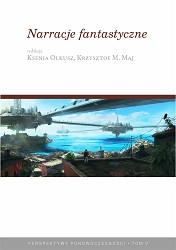Widmowy status utopii w klasycznym Hollywoodzie
The Spectral Status of Utopia in Classical Holywood Cinema
Author(s): Rafał Szczerbakiewicz
Subject(s): Politics / Political Sciences, Social Sciences, Language and Literature Studies, Fine Arts / Performing Arts, Sociology of Culture, Film / Cinema / Cinematography, Sociology of Politics
Published by: Ośrodek Badawczy Facta Ficta
Keywords: capitalism;Hollywood;Hollywood film;King Vidor;Ayn Rand;utopia;utopianism
Summary/Abstract: Rafał Szczerbakiewicz’s chapter looks at the intriguing aspects of the subtle utopianism of the main trends in classic Hollywood cinema. During the thirties, forties and fifties of the twentieth-century and at the peak of liberal modernity there was an omnipresent yet transparent capitalist paradigm. This was a time in cinema where the theme of utopia was obscure. Utopia, in cinema, was more a symptom of a frame of mind and the background to a social state of awarenesss. Within the supportive or critical portrayals of capitalism, the utopian/dystopian elements were notable signs as to the filmmaker’s attitude. Amongst films, the utopian impulse is merely an understatement. However, there is one film with an overt utopian stance. This film is based on the novel, "Fountainhead" (1949) by King Vidor. It was tranformed into a memorable screen adaptation by the enthusiast and theorist, Ayn Rand. In this surprising constructionist vision, the socio-architectural utopia is explicitly portrayed giving the utopian impulse the direction towards what would, years later, come to be known as individualistic neoliberalism.
Book: Narracje fantastyczne
- Page Range: 275-292
- Page Count: 22
- Publication Year: 2017
- Language: Polish
- Content File-PDF

